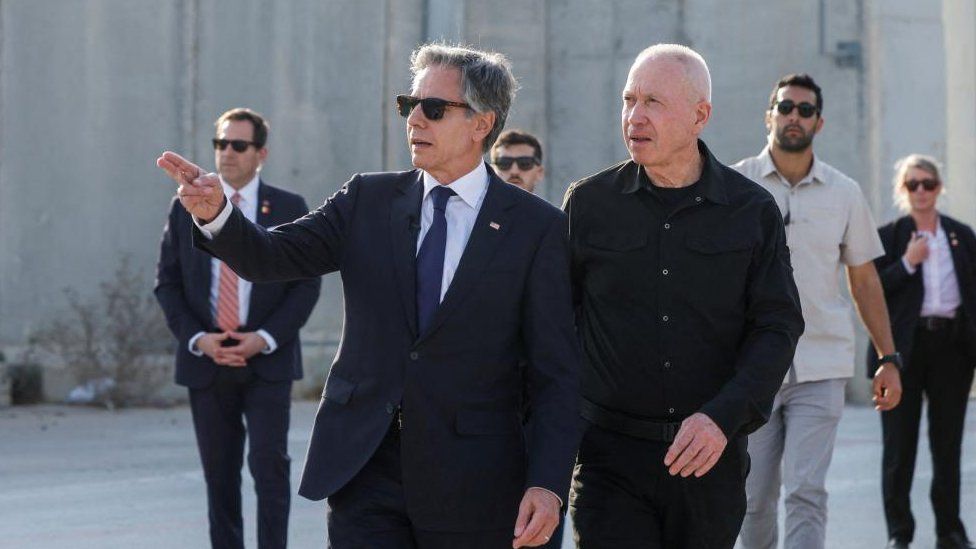Blinken says 'time is now' for Israel-Hamas deal in Gaza
- Published

Mr Blinken - seen here visiting the Kerem Shalom crossing on Wednesday - said more aid was getting into Gaza but this needed to be accelerated
US secretary of state Antony Blinken has told Israel and Hamas that "the time is now" for a deal to bring about a ceasefire in Gaza and free the remaining hostages held there.
Mr Blinken said a deal was on the table and Hamas should agree to it.
Mediators are awaiting a response from Hamas to the latest proposal.
It reportedly involves a 40-day ceasefire and the release of more than 30 Israeli hostages in exchange for many more Palestinian prisoners.
"We are determined to get a ceasefire that brings the hostages home and to get it now, and the only reason that that wouldn't be achieved is because of Hamas," Mr Blinken said as he met Israeli President Isaac Herzog in Tel Aviv.
"There is a proposal on the table, and as we've said, no delays, no excuses. The time is now."
A senior Hamas official has denied the group is to blame for delays on reaching a new deal.
Families of the hostages were demonstrating outside and Mr Blinken greeted them, saying setting their loved ones free was "at the heart of everything we're trying to do".
About 130 hostages from among 253 kidnapped by Hamas during its unprecedented attack on Israel on 7 October remain unaccounted for. At least 34 of them are presumed dead. The rest have been released or rescued.
The top US diplomat later visited the Israeli port of Ashdod, about 30km (20 miles) north of Gaza, where he insisted that Israel had made meaningful concessions to reach a hostage and ceasefire deal.
Mr Blinken said Israel had made progress on getting more aid into Gaza but this needed to be accelerated given the immense scale of need.
Ashdod was recently opened to aid shipments destined for Gaza, where the UN has warned of severe food shortages and looming famine.
On Wednesday the Israel Defense Forces (IDF) said 30 trucks of humanitarian supplies from Jordan had for the first time entered northern Gaza via the Erez crossing.
Mr Blinken also repeated the US position that Israel should not launch a military incursion into the overcrowded southern city of Rafah without a clear plan to protect more than a million Palestinians who have been sheltering from the war there in dire humanitarian conditions.
"On Rafah itself - our position is clear, it has not changed, it won't change. We cannot, will not support a major military operation in Rafah absent an effective plan making sure that civilians are not harmed. We have not seen such a plan," he said.
Rafah is the only major city in Gaza that IDF ground forces have not taken control of during half a year of war. However the city has been repeatedly hit by deadly Israeli air strikes.
On Tuesday Israeli Prime Minister Benjamin Netanyahu - who also met Mr Blinken on Wednesday - said Israel would launch an invasion of Rafah regardless of truce talks with Hamas.
"We will enter Rafah and we will eliminate the Hamas battalions there with or without a deal, in order to achieve the total victory," he said.
Members of Mr Netanyahu's governing coalition are divided on the issue. Foreign Minister Israel Katz told Israeli TV a Rafah operation would be suspended if there was a deal. But far-right ministers have said if that happens they will bring down the government.
The UN, Western allies of Israel and humanitarian agencies have all warned that an assault on Rafah risks a humanitarian disaster.
West Bank-based Palestinian President Mahmoud Abbas said it would be the "biggest catastrophe in the Palestinian people's history" because, he said, it would trigger large-scale displacement of Palestinians out of Gaza entirely.
Israel launched a military campaign in Gaza to destroy Hamas in response to the group's cross-border attack on southern Israel on 7 October, during which about 1,200 people were killed and 253 others were taken hostage.
More than 34,500 people have been killed in Gaza since then, according to the territory's Hamas-run health ministry.